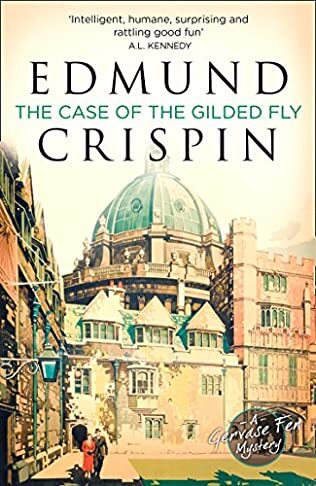The Case Of The Gilded Fly

A review of The Case of the Gilded Fly by Edmund Crispin
A conundrum that dedicated followers of Golden Age detective fiction is face is whether to follow an author’s series in chronological order or to dip in and dive around. The advantages of the former approach is that you can see the author and main character develop, while the latter approach allows you to read their better novels first. For Edmund Crispin, the nom de plume of the music composer, Bruce Montgomery – he is credited with writing the scores of some of the early Carry On films – I am jumping around.
The Case of the Gilded Fly is Crispin’s first novel in his Gervase Fen series and was originally published in 1944. Enjoyable as it is, it is not a patch on The Moving Toyshop. Gervase Fen is a Professor of English Language and Literature at Oxford University and an accomplished amateur sleuth, who, the narrative reveals, has already notched up an impressive tally of successes by the time Crispin decides to introduce him to the reading public. His opposite number, Sir Richard Freeman, is the Chief Constable and an amateur literary critic with pretentions to greatness.
The book opens with an amusing account of the rigours of travelling by train from Didcot to Oxford, a clever device to introduce us to all of the main characters, who, coincidentally, are all travelling on the same train. The story is centred around a theatre group who are about to put on Robert Warner’s latest play. The group is a farrago of lovers and mistresses and there is the usual mix of personal and professional tensions. The focus of attention is a catty but beautiful actress, Yseut Haskell, who is superficially attractive to men but uses them as playthings and earns the enmity of her fellow actresses.
After a wild party, Yseut is found dead in a college room, another case of murder staged to look like a suicide. It is also a locked room mystery of sorts with plenty of suspects but none of whom seemingly had the opportunity of entering the room unobserved. And what was the significance, if any, of the Egyptian-style ring with a gilded fly which was inelegantly fixed to one of the victim’s fingers? It is also another of those stories where two of the suspects are listening intently to the wireless which is playing loudly and muffles any other extraneous noises.
Crispin is a witty writer and while he is at pains to put together a reasonably watertight and intricate plot, it is clear that he is poking fun at some of the genre’s more ludicrous conventions. Some writers, Patricia Wentworth, cannot resist adding a bit of romance into their stories but Crispin out Wentworths her by having almost all of the suspects coupling off, as if Yseult’s murder has opened the floodgates to allow Cupid to do his best.
Crispin, tongue in cheek, provides us with a plan of the crime scene, a detailed timetable of the suspects’ movements against which their alibis can be checked, and interrupts the narrative to tell the reader that something of import was revealed in the previous chapter. At the end of the first chapter, he tells us that by the end three people will be dead, one murder perhaps avoidable if Fen had followed his convictions, and the third death telegraphed by an account of a rogue safety curtain.
Fen tells us repeatedly that he had solved the crime within three minutes of knowing the circumstances, although he needed to garner proof, and while the clues are there, and, frankly, the culprit readily identifiable, the method of the murder is an ingenious take on a locked room.
Crispin has served up an enjoyable romp, it is wonderfully atmospheric and full of acute observations of Oxford life, peppered with quotations from poets both mainstream and obscure, has a lovely ghost story, and is reasonably, if not absolutely fairly, clued. The Gilded Fly has less importance than its role in the title suggests, and it seems to me this is a book where he is finding his feet, his better works yet to come.



